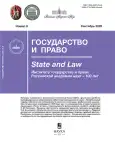Scandinavian identity and features of its construction in the context of the crisis of multiculturalism
- Authors: Cherkasov A.I.1
-
Affiliations:
- Institute of State and Law of the Russian Academy of Sciences
- Issue: No 9 (2025)
- Pages: 149-156
- Section: Abroad
- URL: https://bakhtiniada.ru/1026-9452/article/view/318302
- DOI: https://doi.org/10.31857/S1026945225090142
- ID: 318302
Cite item
Abstract
The Scandinavian identity is based on the similarity of the political systems of the Nordic countries and their common history, a universalistic model of social security, a desire to maintain gender equality and involve as many citizens as possible in labor force activities. Quite significant changes, undermining the foundations of the Scandinavian identity, began to occur at the end of the last century. The most serious challenge was the crisis of multiculturalism, determined by the expanding influx of migrants and the growing difficulties associated with their integration into the life of the host society. Multiculturalism is subject to forced modification. The emphasis is shifting from the idea of integration as a two-way process, within which ethnic Scandinavians and newcomers would gradually move towards each other, learning about each other’s culture and values, to the idea of assimilation, which implies the obligation of migrants to more effectively adapt to their new country and be included in its political and social life.
About the authors
A. I. Cherkasov
Institute of State and Law of the Russian Academy of Sciences
Author for correspondence.
Email: aligorch@yandex.ru
Moscow
References
- Adamo S. The Danish Legal Framework for Migration: Between a Humanitarian Past and a Restrictive Present // Law and Migration in a Changing World / ed. by M.-C. Foblets, J.-Y. Carlier. Cham, 2022. Pp. 261, 297.
- Borevi K. From Multi-Culturalism to Assimilation? Swedish Integration Policy from a European Perspective // Statsvetenskaplig Tidskrift. 2011. Vol. 113. No. 1. P. 47.
- Daun Å. Swedishness as an Obstacle in Cross-Cultural Interaction // Ethnologia Europea. 1984. Vol. 14. No. 2. P. 95.
- Egalitarianism in Scandinavia: Historical and Contemporary Perspectives / ed. by S. Bendixsen, M. B. Bringslid, H. Vike. Cham, 2018. Pp. 22, 24, 26, 61.
- Einhorn E., Harbison Sh., Huss M. An Unfolding History: Scandinavian Migration and Multiculturalism // Scandinavian Review. 2022. Spring/Summer. Pp. 22, 37.
- Geugjes M. Collective Identity and Integration Policy in Denmark and Sweden. Wiesbaden, 2021. Pp. 117, 118, 123, 125, 157.
- Hudson H., Sandberg L., Sundström K. Integrating the Immigrant the Swedish Way? Understandings of Citizenship and Integration in Swedish Local Civic Integration Projects // Journal of Intercultural Studies. 2022. Vol. 44. No. 4. P. 556.
- Kiesel V. The Promise of Universalism – Gender, Migration, and the Limits of the Nordic Welfare State // IZGOnZeit. 2020. No. 9. P. 37.
- Kraus P. A., Kivisto P. The Challenge of Minority Integration: Politics and Policies in the Nordic Nations. Warsaw, 2015. Pp. 48, 52.
- Michael Ch. M. Migration and the Crisis of Democracy in Contemporary Europe. Cham, 2022. Pp. 50, 241.
- Migration and Integration in a Post-Pandemic World: Socioeconomic Opportunities and Challenges / ed. by L. Lerpold, Ö. Sjöberg, K. Wennberg. Cham, 2023. Pp. 110, 111, 122.
- Migration and Multiculturalism in Scandinavia / ed. by E. Einhorn, Sh. Harbison, M. Huss. Madison, 2022. P. 9.
- Migration, Education and Employment: Pathways to Successful Integration / ed. by M. Teräs, A. Osman, E. Eliasson. Cham, 2024. P. 15.
- Migrations and Welfare States: Policies, Discourses and Institutions / еd. by H. V. Jønsson, E. Onasch, S. Pellander, M. Wickström. Helsinki, 2013. Pp. 65, 68.
- Møller Sørrensen T. Cultural Aspects of the Current Scandinavian Identity Crisis: The Case of Denmark – Purity Under Attack // Filisofia I Društvo. 2012. Vol. XXIII. No. 4. Pp. 240, 241.
- Muhammad Sh., Atta A., Muhammad Zaman H. The Nordic Paradox: Unraveling the Complexities of Gender Equality in the Nordic Model // Journal of Policy Research. 2023. Vol. 9. No. 1. P. 310.
- Olsen T. V. Danish Political Culture: Fair Conditions for Inclusion of Immigrants? // Scandinavian Political Studies. 2011. Vol. 34. No. 4. P. 270.
- Rekvig G. The Nordic Peace and Northeast Asia: Approaches, Solutions, and Principles of Conflict Transformation. Singapore, 2024. Pp. 3, 23, 136, 140.
- Vevstad V., Igesund S. Challenging Human Rights: Migration Law in Norway // Law and Migration in a Changing World / ed. by M.-C. Foblets, J.-Y. Carlier. Cham, 2022. Pp. 564, 565.
Supplementary files










